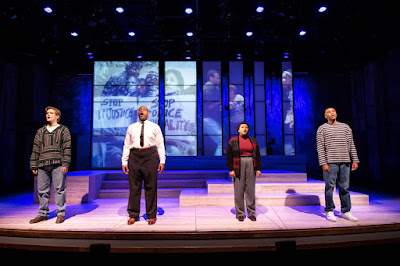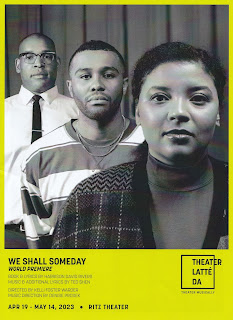The world premiere new musical
We Shall Someday is unlike any musical I've seen. Theater Latte Da continues to expand and redefine the artform of music-theater. This new musical written by prolific and talented #TCTheater playwright Harrison David Rivers and composer Ted Shen is a series of "musical monologues" (as Director of New Work Elissa Adams says in a note in the program). Three characters each tell their story in one act of the piece through a monologue that is both spoken and sung. The three generations of one family tell the story of violence against Black Americans, as well as resistance against injustice and moving towards a better future for all. It's an epic story told in an intimate, moving, and lovely way.
See the innovative We Shall Someday at the Ritz Theater in Northeast Minneapolis now through May 14.
 |
| Roland Hawkins III as Julius (photo by Dan Norman) |
The story begins in 1961 with Julius, a single father of twin girls living in White Plains, Arkansas and working at a diner. When he hears about the Freedom Riders, he feels a sudden urge to join them, and leaves his girls with the kind White woman he works for. He sings about his wife, his children, and his experience with the
Freedom Riders, ultimately singing from a jail cell. The second act jumps forward to 1988, when one of those twins, Ruby, is a single mother of a 15-year-old son named Jay, who is beaten by the police. She sings from a graveyard, to and about her lost family, and about her hopes for a better world for her son. Finally, it's 1992, and Jay gets to tell his story. He's in college in New York City when the world reacts to the
Rodney King verdict. Three generations of protest and activism, with the simple goal of creating a world where Black children can be safe, healthy, and happy.
 |
| Erin Nicole Farsté as Ruby (photo by Dan Norman) |
Kelli Foster Warder directs the piece, giving movement and interest to what is essentially just one person onstage talking to the audience. While each act is primarily a solo piece, the characters do have some interactions, through memories or dreams, or even just providing backup vocals from behind a screen. The set (designed by Sarah Bahr) is a blank canvas - sleek and modern multi-level floor with several screens as a backdrop - that's transformed into various locations through projections of subtle images or historical footage (designed by Kathy Maxwell). The six-piece orchestra led by Music Director Denise Prosek sits behind the screens and sounds gorgeous on this almost continuous two-hour (minus intermission) score. Characters go from speaking to singing and back again, making it hard to differentiate songs, almost like a stream of consciousness. The musical styles vary between acts, going from "jazz, gospel, and protest music" to "idiosyncratic style reflecting the narrator's interior struggle" to "contemporary elements of R&B and early rap" (from a note in the program by the composer). But no matter the style, the music always expresses the emotions of the characters, from rage to hope to confusion to love.
 |
| Ronnie Allen as Jay (photo by Dan Norman) |
This incredible four-person cast, half of them making their debut with Theater Latte Da, is so strong, both vocally and emotionally. Each one of them has a gorgeous voice and fully conveys the journey of their character, and the few moments of harmony are thrilling. Roland Hawkins II is lovely with a big booming voice as Julius, the father just trying to make a better world for his daughters. Erin Nicole Farsté sings like a dream and makes us feel the pain of the mother of a Black boy in a dangerous world. Ronnie Allen is a rising #TCTheater star who fully expresses the anger and frustration of the younger generation, and also provides some humor and lightness. Rounding out the cast is Bradley Johnson in a number of small roles (watch for more of his talent in the upcoming
Next to Normal). The cast is dressed in simple costumes that subtly reflect the period of each character (costume design by Amber Brown).
We Shall Someday ties together several moments in our history, a history of violence and injustice, as well as standing up to injustice and trying to make a better world for our children. It's a historical piece but one that's still relevant today, and ends with a hopeful song about a better future. The title brings to mind the Civil Rights anthem "We Shall Overcome (Someday)" and shows us several of those somedays, and the one we're still working towards.
 |
Bradley Johnson, Roland Hawkins II, Erin Nicole Farsté,
and Ronnie Allen (photo by Dan Norman) |





